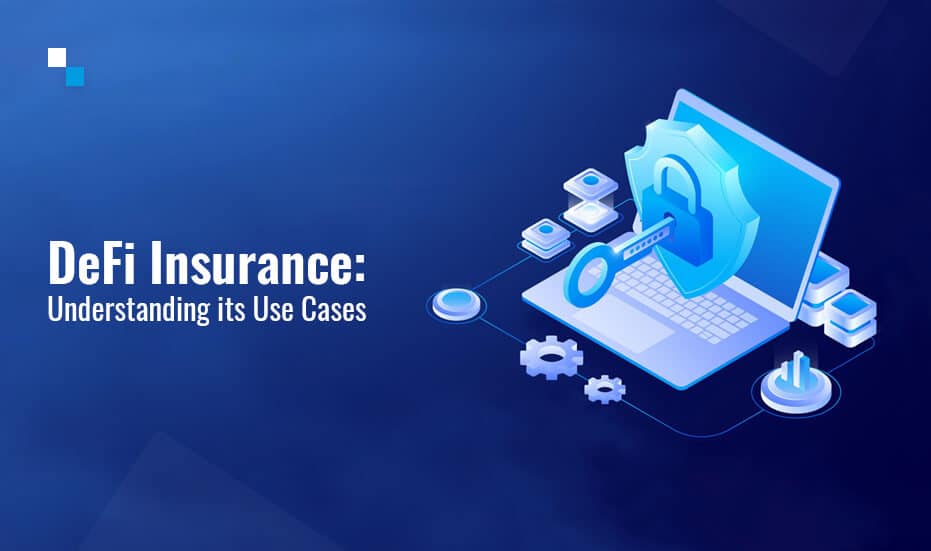
Metaverse NFT Marketplace: A Comprehensive Guide
November 29, 2021
ERC721 Token Development: Your Pathway To A Successful NFT Business
November 30, 2021Services around Decentralized Finance sector have received a lot of attention, such as Crypto loans, Crypto Derivatives, Futures Trading, and so on. Next, the industry has begun exploring the potential to the last and the mostly ignored component of BFSI, the Insurance.
For finance, it is imperative to have a process in place that protects against risks and hazards. With Insurance over blockchain, the industry is moving towards newer dimensions.
The transparency and trustlessness of Blockchain, which forms the cornerstone of DeFi, has the potential to disrupt the Decentralized Insurance industry’s unethical and illegal operations. In the same way that Blockchain acts as a safety net for the general insurance sector, decentralized insurance protocols can display preventative measures and act as safeguards for the crypto industry.
Let’s look at how DeFi Insurance Platform Development Company can use Blockchain technology to secure crypto assets and mitigate risks in this article.
DeFi Insurance Use Cases: A versatile approach
In recent years, there have been numerous incidences of smart-contract hacking, cyber-attacks on exchange platforms, and other incidents that have resulted in significant losses of investor assets. Even the generous DAO was unable to avoid a virus attack on its platform, which resulted in a billion-dollar loss. There are numerous use-cases for decentralized insurance that can assist prevent such outcomes.
Insurance for Crypto Wallets
Some companies have created ways to mitigate the danger of crypto wallet theft in the event of an attack. A recent study has highlighted the growing demand for decentralized insurance, where the majority of audiences agreed that wallets should be covered.
While recognizing the demand for crypto wallet insurance, modern-day DeFi platform operators now offer crypto wallet insurance that covers a considerable quantity. This is a fantastic example of decentralized finance in action.
Loans backed by cryptocurrency need collateral protection
If the borrower’s collateral is destroyed or stolen in a typical situation of Crypto loans, the loan is paid off by the insurance policy. Companies have collaborated to safeguard cryptocurrency loans across the globe and beyond the boundaries.
Coverage for Smart Contracts
The insurance covers the loss if the designated smart contract address is hacked and is used for manipulation, such as the loss of funds from the investor account. Or if the funds are moved to another address that does not belong to the original investor, in this amazing decentralised insurance product called the Smart Contract Cover.
It also covers losses in which monies are irrevocably lost and are unable to be retrieved. As a result, investors and lenders can use the exchange to lend crypto loans without having to worry about payback or losses.
Develop Your Own DeFi Insurance Platform
Schedule Free DemoWhat Is DeFi Insurance and How Does It Work?
Insurance can play a big and prominent position in the Decentralized Finance (DeFi) business industry. The majority of investors are accustomed to insurance, having grown up with fiat currency-based financial concepts. Insurance, whether provided by the FDIC (Federal Deposit Insurance Corporation) or a private supplier, is an important part of the financial industry.
Decentralized Finance (DeFi) can provide a similar sense of safety and security in order to win widespread support by covering the gaps created by conventional insurance players.. Decentralised Finance insurance can help with this.
Why Doesn’t Traditional Insurance Work?
Problem with insurance company agents – business investors and people band together to build various communities and pool resources to share high risks and avoid disasters on their own.
High “friction Amount” – According to historical financial figures, roughly 28% of insurance policyholders’ premiums are provided to the friction amount, limiting the finance industry’s flexibility and efficiency.
Traditional insurance has seen a surge in systemic risks. The user’s interest will not be identified and secured if a certain insurance provider fails. Insurance Companies cannot provide a smooth experience without a digital solution. More importantly, a change in business culture for financial development must start at the top.
Decentralized Finance (DeFi) insurance is now available to protect company investors and opportunity givers in the case of a hack or fraudulent behaviour.
What is the difference between Decentralized Finance Insurance (DeFi) and Decentralized Insurance Applications?
The terms “decentralised finance (DeFi) insurance” and “decentralised insurance applications” are frequently interchanged. The most significant distinction is that Decentralised Finance (DeFi) insurance may relate to securing customers in the DeFi area.
While DeFi Insurance is designed to protect financial transactions, business investors, and DeFi providers, decentralised insurance applications can use any plausible kind of insurance. People can utilise the blockchain to build their own decentralised insurance services and products with the help of a decentralised insurance application.
Some of the intentions of Decentralized Insurance (DeFi) are borrowed from the regular insurance industry market. DeFi Insurance protects businesses, investors, and institutions from financial losses caused by system failures due to fraud or theft.
Decentralized Finance (DeFi) Insurance Swaps Trading
You’re actually swapping insurance stream payments when you do an insurance swap. For example, if a customer pays 0.002 BTC per month for one-year exchange insurance, the payment series can be exchanged on a market like CDx – Credit Default Swap Index. Trading insurance swaps, which are similar to futures, is another historical finance-reproducing technique. You’re trading insurance payments streams when you trade an insurance swap. An interest rate swap is the most common type of exchange. Swaps are not traded on exchanges, and swaps are not typically purchased by regular investors.
Advantages of Decentralized Insurance
Decentralized Insurance products provide comprehensive protection for DeFi deposits, hedge risk against crypto volatility and flash crashes, and secure crypto wallets from theft and attack. They protect customers from any potential DeFi danger, as well as technological and financial hazards, giving investors a sense of security. Not only that, but the platforms also ensure that the entire process of filing, claiming, processing, and reimbursements is safe, secure, and transparent.
Some noted advantages are :
1) DeFi deposits are safeguarded.
2) Crypto volatility and flash crashes are protected.
3) Tokenized crypto can be redeemed immediately.
4) Anti-theft and anti-hacking protection for cryptocurrency wallets
5) Protection of cash on exchange platforms against hacking
6) Protects against both technical and financial risks
7) Payouts on claims are made as soon as possible.
8) Reliable claim and risk evaluation
Conclusion: DeFi is a promising approach for decentralised insurance
Due to the transparency and security it provides to investors, decentralised insurance is a potential area. There are only a few things available at the moment, but they have the potential to grow and expand in the future. For years to come, DeFi and its applications, such as Decentralized Finance, will continue to govern the industry. This is probably the best time to hire a DeFi Insurance Platform Development company to transform your conventional insurance company into a secured and technologically backed insurance powerhouse to write a new script in the future.



